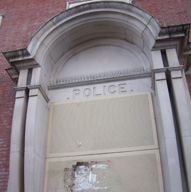A National Police Debate Advisory Group report, Reshaping Policing for the Public, sets out how the police can do ‘modern policing in the age of austerity’. It mentions the private sector – although the group was only made up of police, police commissioners and a union rep – and speaks of ‘willingness to challenge the fundamentals of existing working practices across public services’.
According to the group, policing needs ‘transformation … across a number of areas, including reviewing the skills and make-up of the workforce, maximising opportunities from technology to automate and streamline working practices, and working more closely with partners across the public, private and voluntary sectors’. In more detail, the group saw a role for the private sector in online crime and crime ‘with an international dimension’. The group quoted a report by HMIC that police forces are taking new approaches to policing, but that’s far from generally involving private sector contractors; or as the advisory group’s report put it: “A smaller number of forces were considering how the private sector could be engaged in innovative ways to support cost savings.”
Front-line services (including the safeguarding of vulnerable people and the management of offenders) is proposed to be provided ‘collaboratively with other local public services involved in community safety’. Specialist police work should be done cross-force; and ‘the most highly specialised capabilities such as counter-terrorism) should be provided nationally’. As for making economies of scale, the report suggests a police force could run ‘business support functions’ with other forces, other partners (such as local government) or the private sector.
The advisory group admitted this would take change to working practices; and would require what it called ‘a default position of sharing information and data safely among those working together, potentially requiring national action to remove barriers to appropriate sharing of information’.
As for budget pressures, the group suggested it’s not sustainable, because for example ‘reductions in some services (for example community mental health services) encourage the public to view the police as a ‘public service of last resort’’.
Group members
Members of the advisory group were Alex Marshall, Chief Executive of the College of Policing; Zoë Billingham, HM Inspector of Constabulary; Steve Finnigan. Lancashire Chief Constable; Paddy Tipping, Police and Crime Commissioner for Nottinghamshire; Steve White, Chair of the Police Federation of England and Wales; Irene Curtis and Gavin Thomas, President and Vice-President of the Police Superintendents’ Association of England and Wales; Francis Habgood, Thames Valley Chief Constable; Ben Priestley, National Officer, UNISON; and Nigel Brook, Assistant Chief Officer, West Yorkshire Police. Sir Peter Fahy (Chief Constable of Greater Manchester Police) and Neil Rhodes (Lincolnshire Chief Constable) joined the group. Sara Thornton (Chair of the National Police Chiefs’ Council, NPCC) was involved in the preparation of the paper.
NPCC response
Sara Thornton said: “The next few years will be tough for policing. By the end of this next spending review the police budget is likely to have further reduced by 25 per cent. There is a shift in the work that the police are doing – more crime is being committed in private spaces or the digital world than on the streets, substantial demand comes from tracing missing people and managing dangerous offenders in our communities and chiefs have moved resources to deal with increases in complex, high-risk crime like sexual offences, cybercrime and terrorism. The police will continue to protect and serve the public but it will have to be done differently.
“The National Debate Advisory Group’s report ‘Reshaping Policing for the Public’ is a useful contribution to the debate about what the police service should look like in 2020 and beyond, and the transformation needed to get us there. These are complex issues but there is broad agreement among chief constables that we need to be innovative to meet the challenges we face, changes are required to how policing is structured and our focus must be on prevention, working alongside other services.
“The NPCC and the College of Policing intend to have agreed key reforms and the plan to deliver them by the end of this year, working with the Government and others with a stake in the issue. We will then have an open, honest conversation with the public about the future.”
For the 62-page advisory group report visit – http://www.npcc.police.uk.










